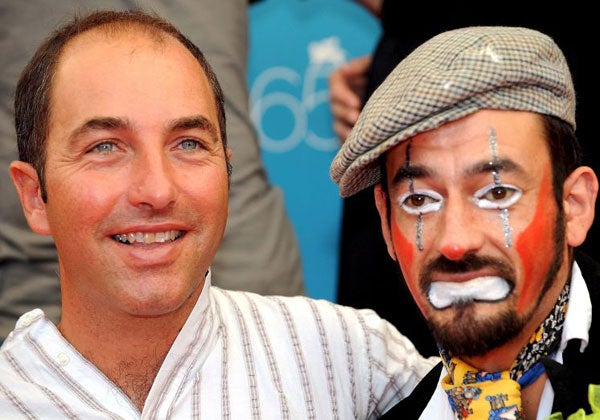Pontecorvo wows Venice with Romanian gypsy film

In 1966, the year he was born, Marco Pontecorvo's father Gillo won the Venice Film Festival's Golden Lion with one of the greatest postwar Italian films, The Battle of Algiers. Forty-two years on, the soft-spoken cinematographer stood with a look of stunned bemusement on his face as the Venice audience gave him a standing ovation and 12 minutes of applause for his first film as director.
He wasn't to know it when he conceived the project seven years ago, but Parada, which opens in Italian cinemas in September, is cruelly relevant to Italy's most pressing national debate. For more than a year the country has been obsessed with what to do about the surge of impoverished immigrants from Romania.
Pontecorvo's debut offering - a feature film not a documentary - is about these people, and the true story of how a Franco-Algerian clown responded to them after a chance meeting in Bucharest. That true story belongs to Miloud Oukili, who flew to Romania in 1992 intending to stay for just a couple of months, but ended up staying for 13 years.
In Bucharest he discovered the “boskettari”: the thousands of children who were the tragic victims of Ceausescu's rule, and of the chaos that followed its dissolution: refugees from families too poor or violent to stay with or from abusive orphanages, who lived like rats in the city's substrata, in tunnels alongside the mains hot water pipes, sleeping on putrid mattresses in cardboard boxes, feared and spurned by their society. They stayed alive by petty theft, drug-dealing and prostitution. Many, even the tiny ones, had become hooked on glue-sniffing.
Miloud was transfixed by their plight, unable to tear himself away. He set about doing something for the boskettari, using his circus skills, and with the help of magic and clowning he slowly overcame their distrust. The result, years later, was Parada, a professional circus troupe made up of former boskettari which travels the world. More than 1,000 children have succeeded in graduating from the sewers with his help.
“It was a story that got to me,” Pontecorvo says, “and when a story gets to you, that gives you the energy to meet the challenges of turning it into a film. It wasn't easy: the fact that we started in 2001 and completed the film in 2007 gives you an idea of the problems we faced.”
Pontecorvo dedicated the film to his father, who died two years ago. “His advice to me while I was making the film was to be careful because it was a difficult film. He liked it a lot, he said, but it was very difficult.” The risk was of descending into pathos and sentimentality, of “polluting” the story as Pontecorvo puts it. The consensus is that he has pulled it off.
“It's a story of love and friendship,” he says. “Because Oukili himself came - not from the sewers but from a similar background. It was a dream he realised through love and respect. Respect was one of the things he taught them, but also perhaps learned from them. Because remember, he himself was only 20 when he arrived, only a little older than the children. They grew up together.”
The challenge of coaxing these children, condemned by their own society as irredeemable, to learn to respect themselves and to stand tall contrasts harshly with what has happened in Italy over the past months, where left and right have competed to propose ever harsher solutions to the “security problem” with the “Rom” pose. Among the most controversial proposals is that of the Berlusconi government to fingerprint all Roma in the country, children included.

Watch Apple TV+ free for 7 days
New subscribers only. £8.99/mo. after free trial. Plan auto-renews until cancelled

Watch Apple TV+ free for 7 days
New subscribers only. £8.99/mo. after free trial. Plan auto-renews until cancelled
“I find this an extremely shocking proposal,” commented Jalil Lespert, the actor who plays Oukili, “one which belongs to the distant past. The fact that people are talking about such things again is a dangerous sign for Europe.”
“The thousand children who have been saved are nothing compared to the thousands still living on the streets who know nothing of joy or hope,” Miloud told the festival audience at Venice. “You don't have to go to Bucharest,” Pontecorvo pointed out. “It's enough to go to the suburbs of Paris or any other great metropolis to find children whose childhood has been denied.”
Join our commenting forum
Join thought-provoking conversations, follow other Independent readers and see their replies
Comments